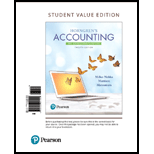
Horngren's Accounting: The Managerial Chapters, Student Value Edition (12th Edition)
12th Edition
ISBN: 9780134491509
Author: MILLER-NOBLES, Tracie L., Mattison, Brenda L., Matsumura, Ella Mae
Publisher: PEARSON
expand_more
expand_more
format_list_bulleted
Concept explainers
Textbook Question
Chapter 6, Problem E6A.27E
Computing periodic inventory amounts
Learning Objective 7 Appendix 6A
Consider the data of the following companies which use the periodic inventory system:

Requirements
1. Supply the missing amounts in the preceding table.
2. Prepare the income statement for the year ended December 31, 2019, for Large Company, which uses the periodic inventory system. Include a complete heading, and show the full computation of cost of goods sold. Larges operating expenses for the year were $12,000.
Expert Solution & Answer
Want to see the full answer?
Check out a sample textbook solution
Students have asked these similar questions
How much is total sales to achieve a net income of $140,000 ?
Hi expert please help me this question
Please provide correct solution and accounting
Chapter 6 Solutions
Horngren's Accounting: The Managerial Chapters, Student Value Edition (12th Edition)
Ch. 6 - Which principle or concept states that business...Ch. 6 - Which inventory costing method assigns to ending...Ch. 6 - Assume Nile.com began April with 14 units of...Ch. 6 - Suppose Nile.com used the weighted-average...Ch. 6 - Which inventory costing method results in the...Ch. 6 - Which of the following is most closely linked to...Ch. 6 - At December 31, 2018, Stevenson Company overstated...Ch. 6 - Suppose Maestro’s had cost of goods sold during...Ch. 6 - Suppose used the LIFO inventory costing method and...Ch. 6 - Prob. 1RQ
Ch. 6 - Prob. 2RQCh. 6 - Prob. 3RQCh. 6 - Prob. 4RQCh. 6 - Discuss some measures that should be taken to...Ch. 6 - Under a perpetual inventory system, what are the...Ch. 6 - When using a perpetual inventory system and the...Ch. 6 - During periods of rising costs, which inventory...Ch. 6 - What does the lower-of-cost-or market (LCM) rule...Ch. 6 - What account is debited when recording the...Ch. 6 - What is the effect on cost of goods sold, gross...Ch. 6 - When does an inventory error cancel out, and why?Ch. 6 - How is inventory turnover calculated, and what it...Ch. 6 - How is days’ sales inventory calculated, and what...Ch. 6 - When using the periodic inventory system, which...Ch. 6 - When using periodic inventory system and...Ch. 6 - Determining inventory accounting principles...Ch. 6 - Determining inventory costing methods Learning...Ch. 6 - Preparing a perpetual Inventory record and journal...Ch. 6 - Preparing a perpetual inventor, record and journal...Ch. 6 - Preparing a perpetual inventor record and journal...Ch. 6 - Preparing a perpetual inventory record and journal...Ch. 6 - Comparing Cost of Goods Sold under FIFO, LIFO, and...Ch. 6 - Applying the lower-of-cost-or-market rule Learning...Ch. 6 - Determining the effect of an inventory error...Ch. 6 - Computing the rate of inventory turnover and days’...Ch. 6 - Computing periodic inventory amounts—FIFO Learning...Ch. 6 - Computing periodic inventory amounts—LIFO Learning...Ch. 6 - Computing periodic inventory...Ch. 6 - Using accounting vocabulary Learning Objective 1,...Ch. 6 - Comparing inventory methods Learning Objective 2...Ch. 6 - Measuring and journalizing merchandise inventory...Ch. 6 - Measuring and journalizing merchandise inventory...Ch. 6 - Measuring ending inventory and cost of goods sold...Ch. 6 - Comparing amounts for cost of goods sold, ending...Ch. 6 - Comparing cost of goods sold and gross...Ch. 6 - Applying the lower-of-cost-or-market rule to...Ch. 6 - Applying the lower-of-cost-or-market rule to...Ch. 6 - Measuring the effect of an inventory error...Ch. 6 - Correcting an inventory error-two years Learning...Ch. 6 - Computing inventory turnover and days’ sales in...Ch. 6 - Comparing ending merchandise inventory, cost of...Ch. 6 - Computing periodic inventory amounts Learning...Ch. 6 - Accounting for inventory using the perpetual...Ch. 6 - Accounting for inventory using the perpetual...Ch. 6 - Accounting principles for inventory and applying...Ch. 6 - Prob. P6.31APGACh. 6 - Prob. P6A.32APGACh. 6 - Prob. P6.33BPGBCh. 6 - Prob. P6.34BPGBCh. 6 - Accounting principles for inventory and applying...Ch. 6 - Prob. P6.36BPGBCh. 6 - Prob. P6A.37BPGBCh. 6 - Prob. P6.38CTCh. 6 - Prob. P6.39CPCh. 6 - Prob. P6.40PSCh. 6 - Prob. 1CPCh. 6 - Prob. 2CPCh. 6 - Prob. 3CPCh. 6 - Prob. 4CPCh. 6 - Prob. 5CPCh. 6 - Prob. 6CPCh. 6 - Prob. 7CPCh. 6 - Prob. 8CPCh. 6 - Prob. 9CPCh. 6 - Prob. 10CPCh. 6 - Prob. 11CPCh. 6 - Prob. 6.1TIATCCh. 6 - Prob. 6.1DCCh. 6 - Prob. 6.1FSC
Knowledge Booster
Learn more about
Need a deep-dive on the concept behind this application? Look no further. Learn more about this topic, accounting and related others by exploring similar questions and additional content below.Similar questions
arrow_back_ios
SEE MORE QUESTIONS
arrow_forward_ios
Recommended textbooks for you
- Century 21 Accounting Multicolumn JournalAccountingISBN:9781337679503Author:GilbertsonPublisher:Cengage
 Cornerstones of Financial AccountingAccountingISBN:9781337690881Author:Jay Rich, Jeff JonesPublisher:Cengage Learning
Cornerstones of Financial AccountingAccountingISBN:9781337690881Author:Jay Rich, Jeff JonesPublisher:Cengage Learning  Financial And Managerial AccountingAccountingISBN:9781337902663Author:WARREN, Carl S.Publisher:Cengage Learning,
Financial And Managerial AccountingAccountingISBN:9781337902663Author:WARREN, Carl S.Publisher:Cengage Learning, Survey of Accounting (Accounting I)AccountingISBN:9781305961883Author:Carl WarrenPublisher:Cengage Learning
Survey of Accounting (Accounting I)AccountingISBN:9781305961883Author:Carl WarrenPublisher:Cengage Learning Financial Accounting: The Impact on Decision Make...AccountingISBN:9781305654174Author:Gary A. Porter, Curtis L. NortonPublisher:Cengage Learning
Financial Accounting: The Impact on Decision Make...AccountingISBN:9781305654174Author:Gary A. Porter, Curtis L. NortonPublisher:Cengage Learning


Century 21 Accounting Multicolumn Journal
Accounting
ISBN:9781337679503
Author:Gilbertson
Publisher:Cengage

Cornerstones of Financial Accounting
Accounting
ISBN:9781337690881
Author:Jay Rich, Jeff Jones
Publisher:Cengage Learning

Financial And Managerial Accounting
Accounting
ISBN:9781337902663
Author:WARREN, Carl S.
Publisher:Cengage Learning,

Survey of Accounting (Accounting I)
Accounting
ISBN:9781305961883
Author:Carl Warren
Publisher:Cengage Learning

Financial Accounting: The Impact on Decision Make...
Accounting
ISBN:9781305654174
Author:Gary A. Porter, Curtis L. Norton
Publisher:Cengage Learning
Chapter 6 Merchandise Inventory; Author: Vicki Stewart;https://www.youtube.com/watch?v=DnrcQLD2yKU;License: Standard YouTube License, CC-BY
Accounting for Merchandising Operations Recording Purchases of Merchandise; Author: Socrat Ghadban;https://www.youtube.com/watch?v=iQp5UoYpG20;License: Standard Youtube License